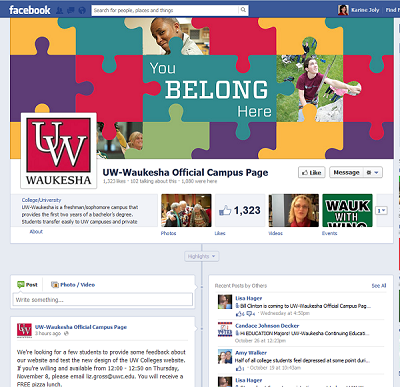While I was doing research for my latest UB column about digital advertising in higher education, I interviewed some great higher ed pros who have used digital advertising to promote their institution or programs.
After publishing Rachel Reuben’s and Nancy Prater’s interviews, I’m sharing today the last interview of this short series.
 Liz Gross, Director of University Marketing & Communications at UW-Waukesha, answered my questions 2 months ago.
Liz Gross, Director of University Marketing & Communications at UW-Waukesha, answered my questions 2 months ago.
1) What are the strategic goals of your online advertising program?
First and foremost I’m seeking to raise community awareness of our campus. Many people call us a “best kept secret” and I’m ready to shed our secret status and make sure everyone knows about us and the quality programs we offer.
Second, I want to reach targeted audiences with targeted messages. Our campus is unique in that 73% of our students live in the county where we’re located. We need hyper-local advertising, and online platforms allow us to do that.
Third, I inevitably want our online advertising to result in more inquiries and applications for admission.
2) What kind of online advertising do you use and why?
In the past we’ve used both display ads and Facebook ads. Our display ads were purchased through a partnership with a local news source and popular search engine. After 12 months of advertising using the display ads and Facebook ads, I chose to discontinue display ads and dedicate all our online advertising budget to Facebook ads. Our 2011-2012 Facebook advertising campaigns cost 33% less than our display advertising and returned 77 times more impressions and 10 times more clicks. The Facebook ads CPM was over 100 times cheaper, and CPC was 15 times cheaper.
3) How successful was online advertising compared to more traditional forms of advertising?
It’s very hard for me to track our other advertising (which was mostly newspapers and public transit). That is one advantage of online advertising – I can tell you exactly how many people saw it, and how many people took action immediately. Our campus is working to develop better online analytics to track the effect of our advertising on real actions – not just clicks, but requests for information, completion of application forms, event registration, etc.
4) With social media and all the other ways to reach target audiences, why does it still make sense to do advertising?
I believe that paid advertising is the only way you’re guaranteed to reach your target audience. While not discounting the value of creating great content and spreading it organically via social channels, I choose to augment our social media presence with paid advertising to amplify our message to reach the audience I’m not organically connected to.




